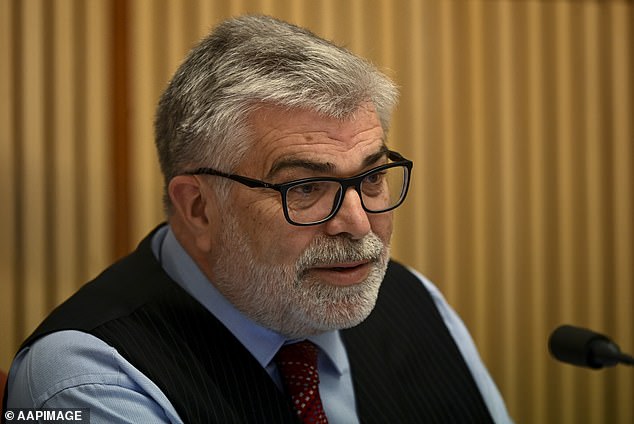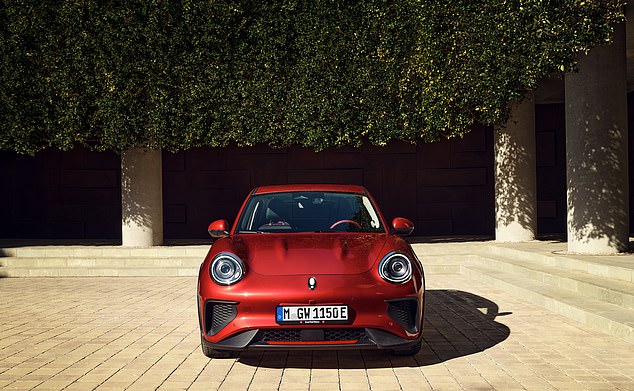Why China is about to flood Australia with electric vehicles – with a dozen new brands expected in the next two years
Chinese electric car makers are expected to flood Australia with cheap imports as the Americans and Europeans launch a trade war to protect their local carmakers.
A dozen new Chinese car brands are expected to be launched in Australia over the next two years. This situation is described as ‘unprecedented’ and will ‘tremendously change the market’.
Former Labor and Industry Minister Kim Carr predicts trade protectionism in the US and European Union will lead to China selling more and more electric cars for less than $40,000 in Australia.
Australia has had a free trade agreement with China since 2015. This means cars from our largest trading partner are sold to Australian motorists without import duties or taxes.
Australians can now buy cheap Chinese EVs, including the BYD Dolphin for $36,890, the MG4 from $39,990 and the GWM Ora from $35,990.
“I have no doubt that there will be cheaper Chinese vehicles,” Carr told Daily Mail Australia.
‘The international manufacturers dropped vehicles here, a testing ground for advanced income economies.
Chinese electric car makers are tipped to flood Australia with cheap imports as the Americans and Europeans raise tariffs to protect their local vehicle makers (pictured is a NIO ETS EV in Beijing)

Former Labor and Industry Minister Kim Carr predicts trade protectionism in the US and European Union will lead to China selling more and more electric vehicles for less than $40,000 in Australia
‘The US will start a trade war with the Chinese to protect their US auto industry; the Germans will take measures to preserve the German car industry; the French still have a very strong industry.
‘There is very little virtue when it comes to international trade relations involving industrial goods.’
Chinese-made cars already control 80 percent of the Australian EV market, with government subsidies from the Chinese Communist Party government could spark a trade war with the US and Europe, leading to higher tariffs on Chinese goods in those markets .
This would see more Chinese electric cars sold in Australia, joining the BYD Atto 3, MG ZS and Chinese-produced versions of the popular US Tesla Model 3 and Model Y.
Car expert Toby Hagon, the editor of EV Centralsaid a dozen Chinese car brands are expected to arrive in Australia over the next two years – including Zeekr, XPeng Motors, Geely, owner of Volvo and Polestar, Lynk and Co, Leapmotor, Jaecoo, Changan and Nio.
“Not all of these have been confirmed – they are expected or have expressed their intention to come to Australia,” he told Daily Mail Australia.
“The looming onslaught of Chinese-made electric cars and hybrids, but mainly electric cars, is unprecedented in the coming years.
‘It looks like there are a dozen new brands coming to the country. It can therefore radically change the market.
‘Australia is a very open market when it comes to the car market; for example, Europe and America are talking about imposing trade sanctions on vehicles made in China to protect their own car manufacturers.’
Mr Carr predicted that Australian motorists would increasingly embrace Chinese cars, as they did with Japanese cars in the 1970s and Korean cars in the 1990s.
“We saw a similar pattern with Japanese vehicles: initially people were hesitant about Japanese and Korean vehicles, but over time they realized that they were high-end products,” he said.
‘So Chinese quality has improved dramatically and will continue to improve, and then you will see serious competition.
“People don’t want to spend $40,000 on a motor vehicle and not feel confident.”

Australians can now buy cheap Chinese electric vehicles, including the BYD Dolphin for $36,890, the MG4 for $39,990 and the GWM Ora (pictured) for $35,990.
Chinese carmakers are also planning to bring even more electric cars and petrol-electric hybrids to Australia with a BYD Shark plug-in hybrid scheduled to take on the Australian-designed but Thai-built Ford later this year Ranger and the Toyota HiLux.
BYD, which has overtaken Tesla as the world’s largest EV maker, is also bringing a Sealion 6 plug-in hybrid SUV to Australia.
Battery-electric vehicles had an 8.1 percent market share in May, compared with 15.8 percent for gasoline-electric hybrids and plug-in hybrids, data from the Federal Chamber of Automotive Industries shows.
“Tesla is bringing their cars from China, BMW is bringing an electric car from China, Kia is about to import an electric car from China and then you have the Chinese brands,” Mr Hagon said.
“China already dominates and it looks like they will build on that.”
